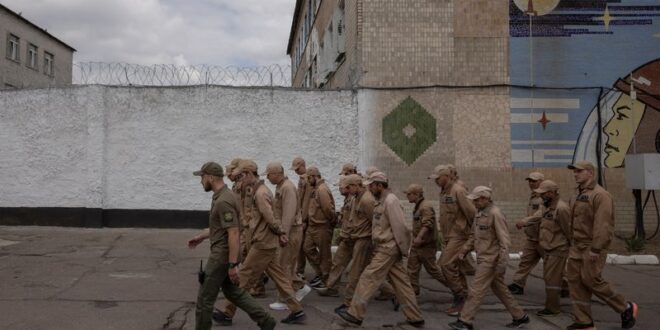KYIV REGION (Reuters) – In its quest to fill the dwindling ranks of its infantry, Ukraine has turned to recruiting prisoners to join the fight against Russia, and more than four thousand have applied so far.
Under a deal offered to inmates by the government, prisoners will have their remaining sentences cleared – regardless of length – if they agree to serve in the army without leave until the end of the war.
At that point they would be granted parole.
“My mother was in hysterics … I’ve been here for five years – a year left and I’m going off to war,” one of those who signed up, Mykola Rybalka, told Reuters in the yard of his prison in Kyiv region.
Rybalka, who said he was in for theft, is one of 129 prisoners in a colony of 700 who have applied to join the military, according to the justice ministry.
“You know, five years behind these walls leave their mark. You’ve seen a lot and understood a lot. You’re not scared of anything anymore,” he said.
Ukraine, whose population of about 38 million compares with Russia’s 144 million, has struggled to recruit enough soldiers, particularly to fight in frontline positions where they bear the brunt of enemy attacks and suffer heavy losses.
Its troops are outnumbered and exhausted, and a new law has recently been signed aimed at mobilising several hundred thousand more soldiers – although it will likely take months for significant numbers of new troops to be ready.
“There is competition between military commanders to hire (prisoners) since there is a lack of manpower, so they really want to have access to these people,” Justice Minister Denys Maliuska told reporters visiting the prison on Thursday.
Recruiters from Ukraine’s 3rd and 5th Assault Brigades who were present at the press event both rated the motivation of the prisoners as generally high.
The 5th Brigade’s representative, who introduced himself as Vladyslav, told Reuters his brigade had recruited around 90 people from the prison, and were recruiting in others.
He said those who joined his brigade would be put into separate, prisoner-only units, and that commanders would keep a close eye on them.
There was, however, little scope for them to desert considering the amount of fire Russia could aim at a disorderly withdrawal, Vladyslav added.
The 3rd Brigade’s representative, Oleh Petrenko, said his brigade would not treat convicts differently to other men.
“We don’t see any difference between normal mobilised (men) and prisoners.”
THOUSANDS APPLY
Early on in the full-scale war, private Russian mercenary group Wagner recruited tens of thousands of Russian prisoners to fight in Ukraine, offering them a full pardon if they survived six months at the front.
Russia’s Defence Ministry has since continued recruiting convicts from prisons for its own Storm-Z formations.
In Ukraine, prisoners convicted of certain offences are barred from serving. These offences include the murder of two or more people, manslaughter through drink-driving, sexual crimes, treason and corruption.
The justice ministry said 4,564 prisoners had applied to join the army so far. They need to pass medical checks and have their application approved by a court – more than 1,700 already have the green light.
The minister has previously said he expects between 10,000 and 20,000 inmates to sign up in total.
Maliuska said he hoped most applicants would be serving in about two months. Reuters was invited into a local courthouse, and saw how a judge approved the application of a man serving a sentence for armed robbery.
He appeared via video link from prison, and the process took about 10 minutes.
The judge, Dmytro Tkachenko, said the prison made sure it only sent applicants who met the law’s criteria, and that he and two other judges had been hearing between 10 and 20 such cases a day over the past week.
Of about 100, two had been rejected, both due to the applicants changing their mind.
Under the new law, 782 prisoners have already been freed from prison and handed over to the armed forces.
“They (will be) in the media spotlight, and if there is a single deserter or a single crime, that would be the type of thing in the media that would be bad PR for us,” Maliuska said.
Twenty-three-year-old Vitaliy Yatsenko, who is halfway through a seven-year sentence for selling drugs, said he had hoped to sign up at the beginning of Russia’s invasion but had not been allowed at that point.
He has now submitted his application to join the army.
“First of all, I want to help my country. And I want society to understand that people have the ability to rehabilitate.”
(Reporting by Max Hunder; Editing by Mike Collett-White and Gareth Jones)
 BeritaKini.biz Berita Viral Terkini di Malaysia
BeritaKini.biz Berita Viral Terkini di Malaysia





